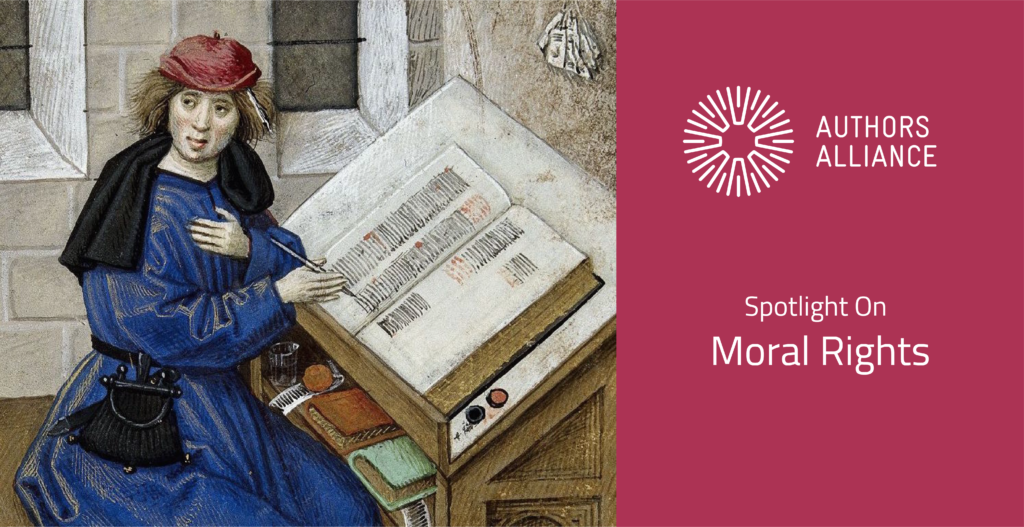
“Author from BL Harley 4425, f. 133” by Guillaume de Lorris and Jean de Meun is licensed under PDM 1.0
The following article, by Authors Alliance co-founder Molly Shaffer Van Houweling, continues our series of posts on the topic of moral rights. Molly is Professor of Law and Associate Dean at UC Berkeley, and a faculty co-director of the Berkeley Center for Law and Technology. She also serves as Board Chair of Creative Commons.
The Copyright Office is considering whether U.S. Copyright law ought to recognize authorial attribution and integrity rights. Authors Alliance submitted comments in support of these rights—if they are carefully crafted and limited—but also proposes two other authorial rights: one to revive one’s work and the other to revise one’s work if the copyright is owned by another.
Here’s why:
Consider the plight of an author who has assigned her copyright to a publisher who is no longer printing the book or making it available online. Perhaps the publisher has lost interest because sales are low; but the author still maintains a strong interest in having her work available to readers. Authors Alliance member Paul Heald’s research suggests just how prevalent this problem is.
The only tool that U.S. copyright law currently provides to authors of works that are effectively locked up in a publishers’ vault is a right to terminate a copyright transfer 35 years later. In theory, authors could use the termination of transfer provision to revive works that have fallen out of print. In practice, the daunting intricacies of the scheme make it difficult for many authors to take advantage of their rights. These challenges are not insurmountable. Authors Alliance and Creative Commons are making efforts to help authors exercise their rights. But even if it works as smoothly as possible, the termination of transfer provision is an awkward solution for authors who want to revive their works. Most glaringly, termination does not take effect for decades after a work was created. In most cases this will be long after a book has gone out of print.
Now consider an author who has changed her mind, on the basis of new research, about an argument she made in a book to which a publisher owns the copyright. She wants to disseminate a revised edition but the publisher denies her permission to create a derivative work based upon the original. An author who is not the owner of copyright in her own work cannot insist, under U.S. law, on her right to revise that work beyond what is permitted by fair use. And, again, the termination right might not be a timely or practical solution.
The prospect of these dilemmas is one motivation for authors who are increasingly retaining and managing their own copyrights. Unfortunately, that movement comes too late for authors who have already assigned their copyrights to publishers. For some such authors, it may be possible to exercise a contractual right of reversion or renegotiate as described in the Authors Alliance Guide to Understanding Rights Reversion. But not every contract includes a reversion clause and not every publisher is willing to renegotiate—even assuming that the publisher is still the copyright owner and can be easily identified and located that purpose (not a safe assumption in light of the well-documented problem of orphan works).
Perhaps what these authors need—in addition to rights of attribution and integrity—are statutory rights to revive and revise their works. Although such rights are not separately identified as part of the authors’ rights tradition, there are some features of copyright laws of other nations that at least nod toward their importance. In a recent article in the Houston Law Review, I explain how the U.S. could borrow from and improve upon these approaches to prevent the dilemmas faced by authors for whom copyright stands as an obstacle to reaching readers with both their existing works and their new ideas.
For more in our series on moral rights, read on!
Pam Samuelson on “A Case for Recognizing Attribution and Integrity as Moral Rights”
Authors Alliance on “The Need for a Nuanced Approach to Attribution and Integrity Rights”
Our comments in response to the Copyright Office study on moral rights
